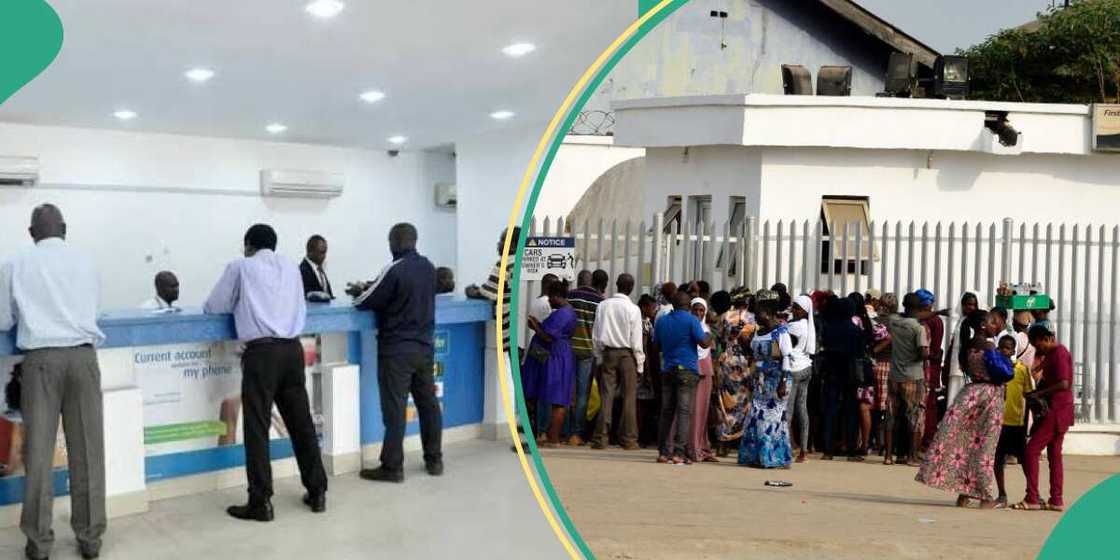Recapitalisation Drives Merger Fever as Smaller Banks Begin Talks
- Smaller Nigerian banks are struggling to meet the N500bn recapitalisation requirement set by the Central Bank of Nigeria
- An analysis of the banking consolidation showed that smaller banks were struggling to raise the required minimum capital
- Already, two Nigerian banks have reportedly received approval from the Central Bank of Nigeria (CBN) to join a merger
Legit.ng’s Pascal Oparada has reported on tech, energy, stocks, investment and the economy for over a decade.
The Central Bank of Nigeria's (CBN) recapitalisation target is set to significantly reshape the country's banking landscape, particularly impacting smaller banks.
The deadline for meeting the new capital requirements is March 31, 2026.

Source: Getty Images
CBN's recapitalisation project impacting smaller banks
According to reports, two Nigerian banks, one with a regional licence and another with a national licence, have started merger talks, which may be finalised in the coming months.
The CBN's directive, which mandates a minimum capital of N500 billion for commercial banks with international licenses, N200 billion for national licenses, and N50 billion for regional licenses, presents a substantial challenge for smaller banks.
Breakdown of impact of CBN recapitalisation target
- Increased Capital Adequacy Ratios: The primary goal is to strengthen the financial resilience of banks, enabling them to absorb unexpected losses and withstand economic shocks. This will lead to improved capital adequacy ratios across the industry.
- Challenges in Meeting Requirements: Many smaller banks, especially those with regional or national licences, will struggle to raise the substantial amount of fresh equity required. This is due to a combination of factors, including current economic conditions, investor appetite, and the sheer scale of the capital needed.
- Mergers and Acquisitions (M&A): This is the most anticipated outcome for smaller banks. Those unable to raise the required capital organically will be forced to either merge with stronger institutions or be acquired. This will lead to a consolidation of the banking sector, reducing the number of players.
- License Downgrades: Some smaller banks might opt to downgrade their operating licences (e.g. from national to regional) if they cannot meet the capital requirements for their current license tier. This would restrict their operations and market reach.
- Enhanced Risk Management: To manage the larger capital base effectively and ensure compliance, banks will need to adopt more rigorous risk management practices, including better credit risk assessment and operational risk management. This may require investment in new tools and technologies.
- Reduced Financial Inclusion (Potential): While the recapitalisation aims for a stronger banking sector, there's a risk that smaller, community-focused banks that serve rural or underserved areas might disappear through mergers, potentially impacting financial inclusion if larger banks do not fill the gap.
- Tighter Credit Conditions for SMEs: Smaller banks often play a crucial role in lending to Small and Medium-sized Enterprises (SMEs). With stricter capital requirements, banks may adopt more conservative lending practices, making it harder for SMEs to access financing.
- Temporary Restrictions: The CBN has already implemented measures like temporarily barring banks that haven't met requirements from paying dividends and bonuses to encourage capital retention. This impacts investor confidence in the short term for affected banks.
Prediction of banks facing merger or acquisition
While it's difficult to name specific banks with certainty, based on reports and industry analysis, the following types of banks are more likely to be involved in mergers or acquisitions:
Tier-3 (Regional) banks:
These banks face the greatest pressure as they often have smaller capital bases and limited access to capital markets compared to larger institutions.
They are the most probable candidates for outright acquisitions or mergers among themselves to meet the N50 billion regional license threshold.
Some Tier-2 (National) Banks
While some Tier-2 banks are actively raising capital, those that are lagging or face significant capital deficits might consider horizontal mergers with other Tier-2 banks to achieve the N200 billion national license requirement.
It is less likely they'll be acquired by Tier-1 banks, as most aim to survive independently.
Banks with existing capital adequacy challenges
Any bank currently struggling to meet the CBN's Capital Adequacy Ratio (CAR) requirement, even before the new recapitalisation, will be under immense pressure.
Banks with limited access to fresh capital
Those without strong shareholder backing or the ability to attract substantial new investment (e.g., through rights issues or public offers) are prime candidates for consolidation.

Source: Getty Images
It's important to note that many banks are actively pursuing various capital-raising strategies, and the landscape is dynamic.
The CBN has also stated that a merger between Providus Bank and Unity Bank has already been approved, indicating the trend has begun.
Expert shares what will influence banking deals
As Nigeria’s banking sector braces for the ripple effects of recapitalisation, investment banking and financial analyst Peace Otonihu outlined critical financial indicators that stakeholders should monitor closely.
“The first two metrics that stakeholders, particularly shareholders and potential investors, would look at are the capital adequacy ratio and the price-to-book value of those banks that they want to buy,” she told Legit.ng.
“Other factors that they would look at would be the return on equity, return on assets because it shows how shareholders' funds are being maximised.”
Otonihu emphasised the importance of the Capital Adequacy Ratio (CAR), describing it as a measure of “financial strength.”
“The CAR would be a very key measure for stakeholders because it looks at the company's view capital and compares it with its risk-weighted assets like loans and investments.”
She further explained that loans carry more risk, hence, “if the loans are higher, then the CAR would be lower. If the capital like share premium, reserves, and retained earnings are higher, then the CAR would be higher.”
Otonihu also warned about the dangers of acquiring distressed banks.
“Another thing they would look at would be the non-performing loans, no bank would want to buy a bank that has high non-performing loans,” she noted.
Speaking on valuation in M&A decisions, she added:
“They also look at the price-to-book value because the real value of banks is in their books (in the amount of deposits and assets.) They also look at their current market cap and assess, ‘Okay, if we buy this bank or if we merge with this bank, does this bank have the capacity to boost our own market cap?’”
10 banks to meet CBN’s N500bn target
Legit.ng also previously reported that the Nigerian banking system is undergoing a significant transformation driven by the Central Bank of Nigeria's (CBN) new minimum capital requirements.
The CBN's recapitalisation exercise aims to strengthen the sector, enhance its resilience to economic shocks, and position it to support national growth, including a projected $1 trillion GDP by 2026.
However, analysts have already projected that ahead of the project's deadline of March 31, 2026, the Tier-1 Banks, which dominate the Nigerian banking landscape, are likely to scale the new hurdle.
Editorial assistant Ololade Olatimehin provided exclusive commentary from an investment banking analyst for this report.
Proofreading by Bruce Douglas, copy editor at Legit.ng.
Source: Legit.ng






